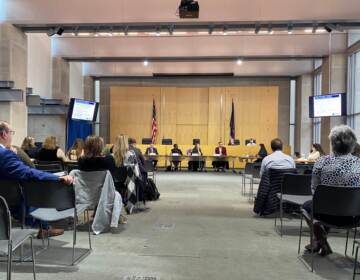Philly Council panel wants to develop workplace guidelines on medical marijuana
Councilwoman Cherelle Parker hopes to work with stakeholders across the city on guidelines to help patients figure out their rights and prevent negative consequences.

City Councilwoman Cherelle Parker says Philadelphia needs a public education campaign to keep workers — and their employers — up to speed on medical marijuana's rapidly changing legal landscape. (Emma Lee/WHYY)
Here’s the dilemma. Say you went through all the legal steps to get your medical marijuana card, and you take your legally acquired medical marijuana consistently to treat your glaucoma, or epilepsy, or PTSD.
But, if your employer suspects you’re using marijuana, you can be drug tested. And if you fail, you can be fired.
Cannabis is a schedule I drug under federal law, meaning it’s illegal. But under Pennsylvania law, medical marijuana is legal for patients with certain conditions. This puts employers — and workers — in a tough spot. So Philadelphia City Council’s Labor and Civil Service Committee is working on developing a response to this tension now.
“It’s such a rapidly evolving area … I don’t need to tell all of you that five or 10 years ago, if you told me we would be sitting here talking about this, I would not have believed you,” said George Voegele, one of the lawyers the committee invited to discuss the intersection of medical marijuana and the law during a Wednesday session in City Hall.
This is the tension: Medical marijuana patients have the right to medicate with cannabis under state law, and they have the right to medical privacy. But employers abide by federal law, and federal employers have to abide by the Drug-Free Workplace Act.
To make matters more complicated, state law has specific regulations for employers. Medical marijuana patients should not work in some construction jobs that involve confined spaces or heights, according to Pennsylvania law. But employers have broad discretion in identifying positions as “safety sensitive.”
“Employers may prohibit patients who are employees from performing any task which the employer deems life-threatening to the employee or other employees while under the influence of marijuana,” the law states.
It’s not clear how the state is defining “under the influence,” said Josh Horn, partner and co-chair of the cannabis law practice of Fox Rothschild. People can fail a drug test — but what a drug test determines is use, not impairment.
“I think there’s a gap in the law as to what it means to be under the influence,” Horn said.
It’s also possible that a medical marijuana patient who drives a school bus could be hired one day and fired the next for failing a drug test — because of zero-tolerance policies.
Lawsuits, then, seem inevitable, said Horn. And patients would have a legitimate claim. A Massachusetts court ruled last year employers can’t fire a medical marijuana patient for failing a drug test.
Rather than agonize over state versus federal law, Councilwoman Helen Gym said, now is really the time to educate employers and employees.
“Health issues ought not to be criminalized,” she said, adding that the priority should be helping patients, “become their most full self by being able to work in the workplace, no matter their particular situations.”
Councilwoman Cherelle Parker said she hopes to work with stakeholders across the city to create guidelines that can help patients figure out their rights and prevent negative consequences — even if those guidelines aren’t legally binding.
“We are just talking about some sort of guide that we can actively publicize, like a public service announcement or advisory for workers in the city of Philadelphia,” Parker said.
For now, there aren’t many easy answers, but Parker said the city needs a public education campaign to keep workers — and their employers — up to speed on the rapidly changing legal landscape.
WHYY is your source for fact-based, in-depth journalism and information. As a nonprofit organization, we rely on financial support from readers like you. Please give today.




